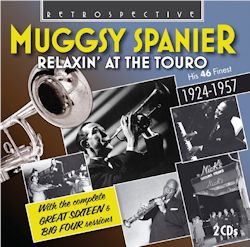Big Butter and Egg Man
Someday, Sweetheart
Eccentric
That Da-Da Strain
At the Jazz Band Ball
I Wish I Could Shimmy Like My Sister Kate
Dippermouth Blues
Livery Stable Blues
Riverboat Shuffle
Relaxin' at the Touro
At Sundown
Bluin' the Blues
The Lonesome Road
Dinah
Black and Blue
Mandy, Make up Your Mind
Four or Five Times
Sweet Lorraine
Muggsy Spanier
Lazy River
China Boy
If I Could Be with You One Hour Tonight
That's a Plenty
Squeeze Me
Sweet Sue, Just You
Mobile Blues
There'll Be Some Changes Made
Lewisada Blues
Muggsy Spanier
Royal Garden Blues
My Wild Irish Rose
Down to Steamboat Tennessee
Sugar, That Sugar Baby of Mine
Little David, Play on Your Harp
Hesitating Blues
Two O'clock Jump
Weary Blues
Snag It!
Oh, Lady, Be Good!
September in the Rain
Muggsy Spanier
Memphis Blues
Rosetta
Feather Brain Blues
Muggsy Spanier
Muggsy Special
When My Dreamboat Comes Home
Judy
Tin Roof Blues
A Monday Date
Muggsy Spanier (cornet) with his Ragtime Band, Bechet-Spanier Big Four, Bucktown Five, Chicago Rhythm Kings, Ted Lewis and his Band, Ben Pollack and his
Pick A Rib Boys, Lee Wiley, Muggsy Spanier and his Orchestra and Ragtimers and Jazz Band; The Hines-Spanier All Stars
Recorded 1924-57
RETROSPECTIVE RTS 4254
[77:40 + 78:20]
As the booklet cover announces, one of the principal virtues of this twofer is its inclusion of the complete Great Sixteen and Big Four sessions. One might
have feared a selection only, given Retrospective’s usual compilation policy, so this is welcome indeed. Both these sessions make up the first disc and
they surely need little introduction, representing in many ways the apogee of Muggsy Spanier’s studio career. The Sixteen, recorded on four days between
July and December 1939, featured a succession of tenor sax players and other musicians but the core of Spanier, trombonist George Brunies and clarinettist
Rod Cless (invariably underrated) remained. Spanier’s driving cornet lead, stylistically and timbrally derived from King Oliver, marries excitement with
pugnacity, ringing declamation with blues-drenched South Side richness, his vibrato coiling and twisting tightly. These are his most famous sides,
notwithstanding the later post-war ones, but it’s wise not to overlook Brunies’ booting trombone, George Zack’s rolling boogie-infused piano playing, tenor
player Nick Caiazza – like Cless grievously overlooked by most Jazz historians – and his rhapsodic Hawkins-based solos, nor indeed Bernie Billings’
contributions; another underrated tenor stylist. To have these tracks followed by The Big Four – Spanier, Sidney Bechet, guitarist Carmen Mastren and
bassist Wellman Braud – and their 1940 Chamber Jazz recordings is to have a surfeit of riches. The dovetailing intimacy of these sessions, the collective
beauty of the foursome, is augmented by tasteful cadential passages for the horn men, and the spirit of selfless, collaborative lyricism. This kind of
thing was almost unparalleled in Bechet’s legacy on disc, where macho jousting with trumpet leads was a norm.
The second disc delves both back and then forward, from 1924 when, as a 17 year old, he first recorded with the Bucktown Five, to a souvenir from the Club
Hangover, San Francisco in 1957 where he co-led a band with Earl Hines. This first is the only acoustic recording in the set but shows his chops in fine
working order, indeed precociously so, alongside the influential clarinettist Volly de Faut. There’s a track from The Chicago Rhythm Kings, an all-star
band including Frank Teschemacher and Mezz Mezzrow, Joe Sullivan, Eddie Condon and Gene Krupa. Ted Lewis may have had a bad press down the years for his
gas-pipe clarinetting but he certainly knew how to nurture great Jazz players and Royal Garden Blues has long been a favourite of mine with
Spanier’s dynamic lead and Fats Waller’s ebullient piano playing and vocalising. The Ben Pollack track – My Wild Irish Rose – is not nearly so
well-known and interesting to hear for that reason alone. The two tracks where Spanier accompanies Lee Wiley – famously reissued badly pitched on LP all
those years ago – are graced also by Jess Stacy’s beautiful piano playing Spanier’s succession of bands from the 40s onwards, some smaller ensembles called
the Ragtimers, others larger and called his Orchestra, continue the high level of executant skill. We hear from celebrated sidemen such as Pee Wee Russell,
Ernie Caceres, Lou McGarity et al. Perhaps less familiar, even to Muggsy mavens are the 1954 Deccas with trombonist Ralph Hutchinson and clarinettist Phil
Gomez alongside in the front line. These full-toned tracks are well worth getting to know as the players are interesting and there’s an excellent rhythm
section – Truck Parham, no less, is on bass.
Digby Fairweather pays excellent homage to Muggsy in his booklet notes, and admirers of the cornetist – certainly those who lack the full 16 or Big Four –
should seriously consider this smoothly transferred release.
Jonathan Woolf
